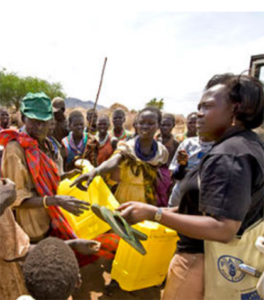Uganda cracks down on refugee aid agencies
Three quarters of refugee aid organisations operating in Uganda have effectively been closed because of a crackdown by the Ugandan Government over compliance with rules.
The move affects more than 200 agencies, including 85 international groups, who have been accused of non-compliance with operational rules.
 A government spokesman said the agencies had been operating in refugee settlements illegally, without government approval, but activists say the move will impact the more than 1.4 million vulnerable refugees in the East African nation, which is still under COVID-19 lockdown.
A government spokesman said the agencies had been operating in refugee settlements illegally, without government approval, but activists say the move will impact the more than 1.4 million vulnerable refugees in the East African nation, which is still under COVID-19 lockdown.
The refugees are mainly from neighbouring South Sudan, the Democratic Republic of the Congo and Burundi.
Uganda has a recent history of tensions with refugee aid organisations and the move comes as the country’s refugee crisis has worsened, because of the resurgence of violence in the neighbouring Democratic Republic of Congo (DRC) and the impact of the COVID-10 pandemic.
For more than a decade, Uganda has been a safe haven for refugees. The country lies at a sensitive crossroads in East Africa. It has neighbours like the DRC and South Sudan. These countries have long histories of conflict and continue to be sources of refugees.
The UN refugee agency UNHCR says Uganda is one of the most welcoming environments in the world for refugees. Other nearby countries like Kenya and Ethiopia host refugees in camps, but Uganda allows them to set up businesses, find employment, and move freely around the country.
The majority of refugees live in Uganda’s rural settlements, where they are allocated plots of land and given materials to build basic homes. They are also given food aid and access to basic health and education services, but they are also free to build a life in the capital Kampala.
This is the result of the 2017 Comprehensive Refugee Response Framework, developed by the UN and launched by the Ugandan government which promotes the inclusion of refugees in host communities, ensures the involvement of development actors from an early stage, and encourages a “whole-of-society” approach to refugee responses.
Uganda was among the first countries to pilot the framework because it has signed all the key refugee conventions and international human rights treaties.
Also, Uganda is also one of the largest refugee-hosting countries in Africa, hosting over 1.4 million refugees.
The refugee population makes up 3.6 per cent of the country’s total population of 39 million.
Most refugees are from South Sudan (74 per cent), 19 per cent are from the DRC, and 3 per cent are from Burundi.
Despite a huge refugee burden, Uganda maintains one of the most progressive refugee protection policies in the world. Its integrated refugee response has been named as a model implementation of the UN’s framework. Refugees in Uganda are granted freedom of movement, the right to work and establish businesses, and the right to access public services such as education.
But the crackdown comes as ten refugees were killed and 19 injured in violence that flared in the Madi Okollo district, in t northern Uganda.
UNHCR, the UN Refugee Agency, is saddened and alarmed by the violent events that left 10 refugees dead and 19 injured, including one member of the host community, in Madi Okollo district in the northern region of Uganda.
Reports say a dispute between locals and refugees near a shared water point escalated into a violent attack on refugees at the Tika village in the Rhino camp, where refugees from South Sudan live.
As well as the casualties, 15 refugee houses were burnt to the ground and another 26 were looted and vandalized.
A UNHCR spokesman said: “The disproportionate violent reaction by the host community to a communal dispute signals a threat to the delicate balance of peaceful coexistence in the rural villages where refugees live alongside their Ugandan hosts”.
“In an environment of scarcity of resources, tragic incidents such as that of last Friday are alarming, as both the host and refugee communities face increased hardships and decreased access to basic services and livelihoods,” the spokesman said.
UNHCR has deployed teams on the ground to support refugees who are traumatised by the attack and respond to the needs of those affected while also initiating reconciliatory efforts, it said.












